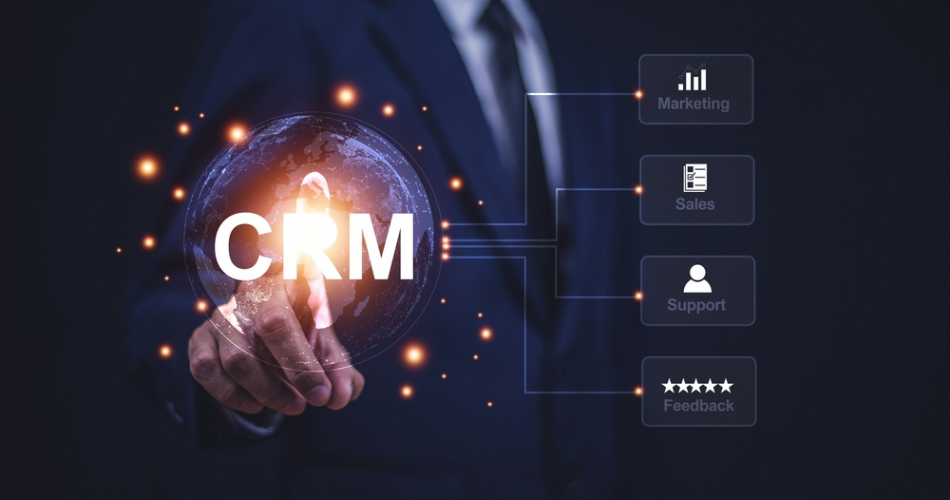
Customer Relationship Management (CRM): A Strategic Approach To Building Lasting Client Relationships
Customer Relationship Management (CRM) transcends the notion of being merely a tool; it embodies a holistic strategy aimed at cultivating and enhancing client relationships. In today’s landscape, where customer expectations are continually escalating, the strategic use of CRM systems is vital for businesses aspiring to achieve sustainable growth and forge strong connections.
CRM systems offer a suite of features designed to deepen interactions and build enduring relationships with both clients and stakeholders. By leveraging these capabilities, organizations can transform their approach to managing customer relationships, ensuring they meet and exceed evolving expectations.
Effective CRM implementation not only streamlines communication but also personalizes the customer experience, ultimately fostering trust and loyalty. Understanding and utilizing the full potential of CRM systems enables businesses to stay ahead in a competitive market, ensuring long-term success and robust client engagement.
What Is CRM?
Customer Relationship Management (CRM) encompasses the strategies and technologies businesses use to manage and analyze interactions with their customers throughout their engagement lifecycle. CRM systems are designed to collect, store, and scrutinize customer data, enabling businesses to tailor their interactions and enhance overall service quality. By offering deep insights into customer behaviors and preferences, CRM tools facilitate more personalized and effective communication.
At its essence, CRM helps organizations streamline communication and adapt interactions to meet the specific needs of each customer. This approach not only boosts customer satisfaction but also improves the efficiency of sales and marketing strategies.
Key Advantages of CRM Systems
A robust CRM system centralizes customer data, making it readily available to all relevant teams within a business. This centralization fosters improved collaboration among sales, marketing, and customer support departments. When these teams operate cohesively, they can share valuable insights into customer preferences and behavior, resulting in more synchronized strategies and enhanced customer interactions.
Moreover, CRM systems enable timely follow-ups and personalized communication by retaining details of past interactions and customer preferences. This personalized touch is crucial in today’s competitive landscape, as it helps businesses differentiate themselves and cultivate lasting customer loyalty.
Benefits of Using CRM for Businesses
Enhancing Customer Retention
Customer Relationship Management (CRM) systems offer a powerful advantage in boosting customer retention. By meticulously tracking customer preferences and behaviors, businesses can adapt their services to meet evolving needs. For example, a CRM system can pinpoint customers who may be on the verge of leaving, allowing businesses to implement targeted retention strategies effectively.
Streamlining Communication
A major benefit of CRM systems is their ability to centralize data, facilitating swift and efficient access to crucial information. This centralized approach promotes better team collaboration and speeds up the resolution of customer issues. Effective communication within teams enhances overall customer service quality. For instance, when multiple departments are involved in addressing a customer’s issue, a CRM system ensures that all team members have consistent information, avoiding redundant efforts and delivering a unified response.
Facilitating Personalized Interactions
In a competitive market, personalized interactions are essential for standing out. CRM systems empower businesses to collect and analyze data on customer purchasing patterns and preferences. This insight enables targeted marketing and customized service, making customers feel valued and understood. For instance, a CRM system can analyze a customer’s purchase history to provide personalized recommendations and offers, thereby enhancing the customer experience.
How to Implement CRM for Your Business
Selecting the Optimal CRM Software
Choosing the right CRM (Customer Relationship Management) software is a critical decision for the effective execution of CRM strategies. Leading CRM platforms such as Salesforce, HubSpot, and Zoho each offer unique features tailored to different business needs. To make a well-informed choice, evaluate each CRM option based on factors like your business size, budget constraints, and required functionalities—whether it’s advanced sales automation or extensive customer support capabilities. This careful assessment ensures that the CRM solution you select aligns with your organization’s specific requirements and goals.
Comprehensive Employee Training
The success of CRM implementation relies heavily on thorough employee training. After selecting your CRM system, arrange detailed training sessions or workshops to ensure your team is proficient in using the software. These sessions should foster open communication to address any questions or concerns. Effective training empowers your staff to accurately input and access customer data and utilize CRM tools for monitoring and analyzing customer interactions. This preparation helps maximize the benefits of the CRM system and facilitates a smooth transition.
Defining Clear Objectives
For a successful CRM system deployment, it’s essential to establish clear and measurable objectives. Determine what you aim to accomplish with your CRM, such as boosting customer retention, optimizing communication processes, or enhancing data analysis. Set specific and quantifiable goals to track progress accurately. Regularly review the CRM system’s performance in relation to these objectives and adjust strategies based on the insights obtained. For instance, if improving customer satisfaction is a key goal, use the CRM system to collect and analyze feedback, and implement improvements as needed.
Case Studies of Successful CRM Implementation
Retail Industry Example
A prominent fashion retailer implemented a Customer Relationship Management (CRM) system to enhance its understanding of customer preferences and shopping habits. This strategic move allowed the company to deliver tailored promotions, leading to a notable boost in both customer loyalty and sales figures. By analyzing detailed customer data, the CRM system facilitated the customization of marketing campaigns and product assortments, aligning more closely with consumer desires and improving overall engagement.
Healthcare Industry Example
An esteemed medical institution adopted a CRM system to refine its patient relationship management. The system’s automation of appointment reminders and follow-ups resulted in improved patient satisfaction and a reduction in missed appointments. Additionally, the CRM system optimized communication workflows, enabling more efficient management of patient interactions and ensuring prompt and effective support.
Technology Sector Example
A leading software firm integrated its customer support operations with advanced CRM tools, which significantly enhanced the tracking and resolution of customer issues. This integration not only accelerated issue resolution but also increased customer retention rates. The CRM system’s capabilities improved internal communication and problem-solving, contributing to heightened customer satisfaction and stronger loyalty.
Tips for Building Stronger Personal Connections
Effective Communication
Establishing meaningful personal connections hinges on effective communication skills. Begin by maintaining eye contact and demonstrating genuine curiosity about the other person. These small, yet powerful actions project confidence and attentiveness, making the other person feel recognized and valued. Instead of posing a simple question like, “Did you have a good weekend?” opt for more engaging inquiries such as, “How did you spend your weekend?”
Active Listening
Active listening is essential for cultivating trust and rapport. Show engagement by occasionally nodding and using affirming remarks like “I understand” or “That’s interesting.” Such responses indicate that you are fully present in the conversation. Refrain from interrupting and allow the other person ample time to articulate their thoughts. This respect not only promotes a constructive dialogue but also strengthens the overall connection between you.
Nonverbal Communication
Nonverbal cues are integral to forming strong personal bonds. Pay attention to your body language to ensure it mirrors your engagement in the conversation. Subtle actions, such as leaning slightly forward or employing natural hand gestures, can enhance the interaction. Ensure that your gestures are not overly distracting, as positive nonverbal communication reinforces your attentiveness and interest in the dialogue.
Understanding ERP Systems: An Overview
What Are ERP Systems?
Enterprise Resource Planning (ERP) systems are comprehensive software solutions designed to streamline and synchronize essential business operations across an organization. By integrating various functions—such as finance, human resources, manufacturing, and supply chain management—ERP systems break down data silos and provide a centralized source of accurate information. This unified approach enables real-time data access, enhances decision-making capabilities, and fosters efficient management of resources.
The Core Functions of ERP Systems
Financial Management
ERP systems streamline financial processes by integrating accounting, budgeting, and financial reporting functions. This integration ensures precision and regulatory compliance, while also providing a holistic view of an organization’s financial status.
Human Resources
In the realm of human resources, ERP modules effectively manage employee data, payroll, recruitment, and performance evaluations. These functionalities enhance workforce management and facilitate more informed decision-making in human resource management.
Manufacturing
ERP systems play a crucial role in manufacturing by overseeing production scheduling, inventory control, and quality assurance. By optimizing these processes, organizations can achieve greater efficiency and cost savings in their manufacturing operations.
Supply Chain Management
ERP systems integrate key aspects of supply chain management, including logistics, procurement, and supplier interactions. This integration ensures smooth supply chain operations by managing inventory, tracking shipments, and coordinating effectively with suppliers.
The Benefits of Implementing ERP Systems
Enhanced Efficiency and Productivity
Enterprise Resource Planning (ERP) systems streamline repetitive tasks and consolidate data across various departments, minimizing manual input and reducing error risks. By automating these routine processes, employees are freed up to concentrate on more strategic initiatives, thereby boosting overall productivity.
Improved Decision-Making
ERP systems equip businesses with real-time analytics and reporting tools, delivering actionable insights into operational performance. This immediate access to accurate, current data empowers managers to make well-informed decisions swiftly, enhancing the quality and speed of decision-making.
Scalability and Flexibility
Contemporary ERP solutions are engineered to support business growth and adaptation. Whether a company is entering new markets or expanding its operations, ERP systems offer the scalability and flexibility needed to meet evolving demands, ensuring sustained development and operational efficiency.
Key Considerations for ERP Implementation
Conducting a Comprehensive Needs Assessment
Before selecting an ERP (Enterprise Resource Planning) system, it’s vital to perform an in-depth needs assessment for your organization. This process involves identifying the critical business processes that need integration and determining the specific functionalities required. This assessment will be instrumental in guiding you toward an ERP solution that aligns with your strategic business objectives.
Choosing the Right ERP Solution
Selecting an appropriate ERP solution is a pivotal decision for any organization. Key considerations should include the system’s adaptability, ease of use, and the reputation of the vendor. You should also evaluate whether a cloud-based or on-premise ERP solution best suits your business needs and current infrastructure.
Ensuring Effective Data Migration and Integration
Data migration plays a crucial role in ERP system implementation. It is essential to ensure that all existing data is accurately transferred to the new system to avoid data inconsistencies. Additionally, effective integration with existing systems is necessary to maintain operational continuity and prevent disruptions.
Investing in Training and Change Management
The success of an ERP system implementation largely depends on user acceptance. Investing in thorough training programs is crucial to ensure that employees are proficient in using the new system. Implementing robust change management strategies will also support staff in adapting to new processes and workflows, facilitating a smoother transition.
Emerging Trends in ERP Systems
Advantages of Cloud-Based ERP Solutions
Cloud-based ERP systems provide significant advantages over traditional on-premise solutions by offering enhanced flexibility and accessibility. Users can access critical data from virtually any location, which supports remote work and collaboration. Additionally, these systems typically have lower initial costs and are easier to scale, making them a cost-effective choice for many organizations.
Incorporation of AI and Machine Learning
The integration of Artificial Intelligence (AI) and Machine Learning (ML) into ERP systems is transforming how businesses manage their operations. These advanced technologies facilitate predictive analytics, automate repetitive tasks, and deliver actionable insights. By leveraging AI and ML, businesses can improve their operational efficiency and gain foresight into emerging trends.
Emphasis on User Experience
Contemporary ERP systems prioritize user experience with their intuitive and user-friendly interfaces. This focus on design enhances user engagement and ensures that employees can easily navigate and utilize the system, ultimately leading to more efficient task performance and higher adoption rates.
Conclusion
In the landscape of contemporary business operations, CRM and ERP systems are indispensable. CRM systems are essential for refining customer interactions and fostering enduring relationships, utilizing tailored communication strategies and actionable insights derived from data. On the other hand, ERP systems are crucial for optimizing core business functions, enhancing operational efficiency, and facilitating informed decision-making. By mastering the implementation of these systems, organizations can significantly boost customer satisfaction, streamline their operations, and elevate their overall business performance.
Keep up-to-date with breaking news and updates on MumbaiBreaking

